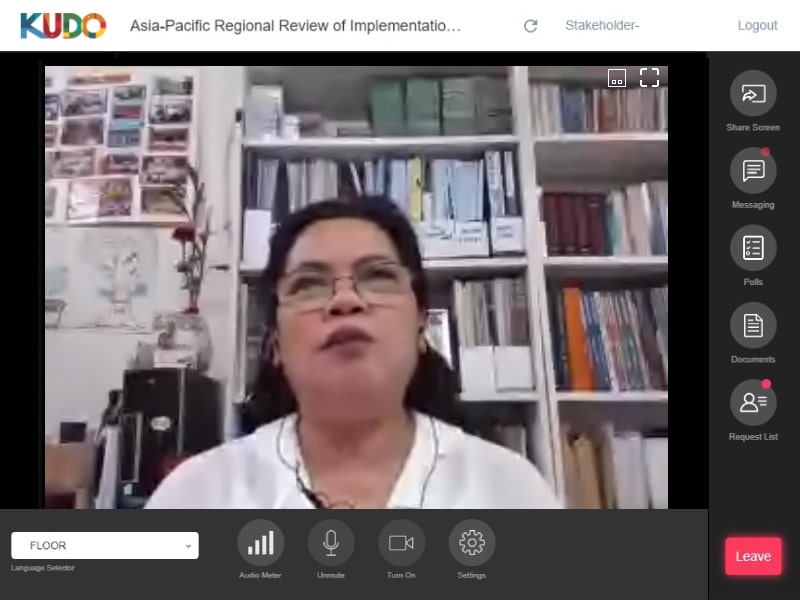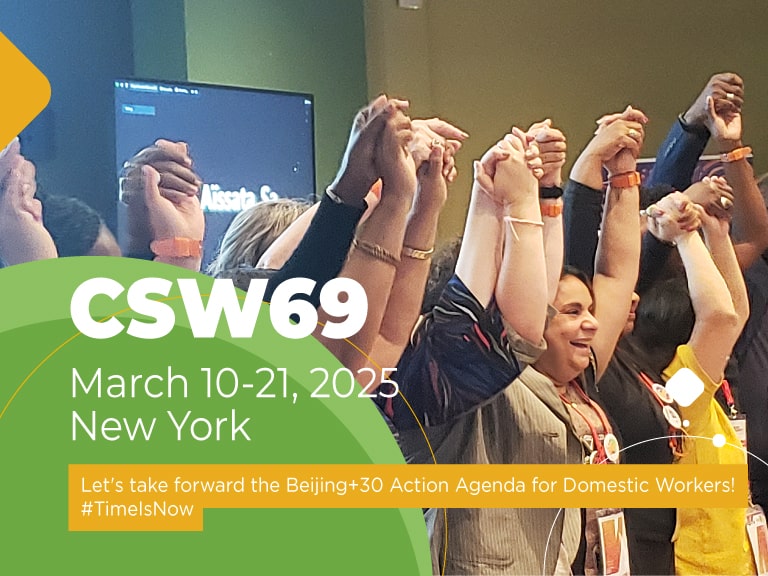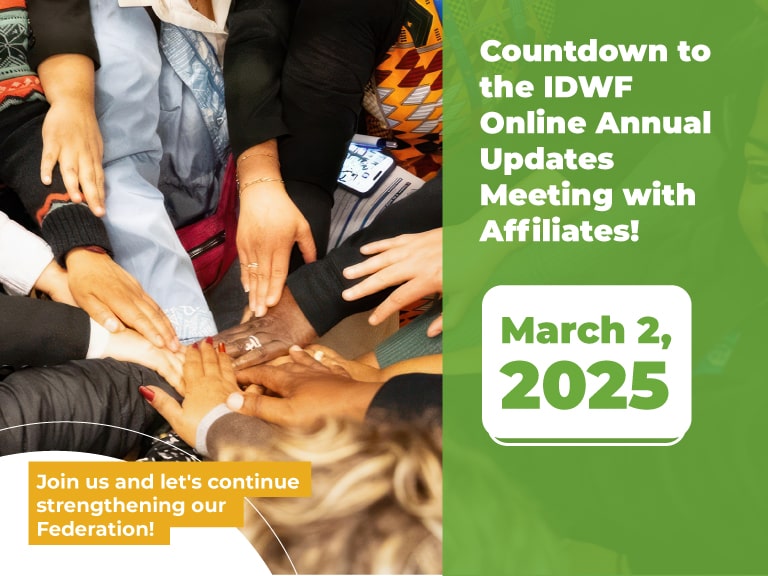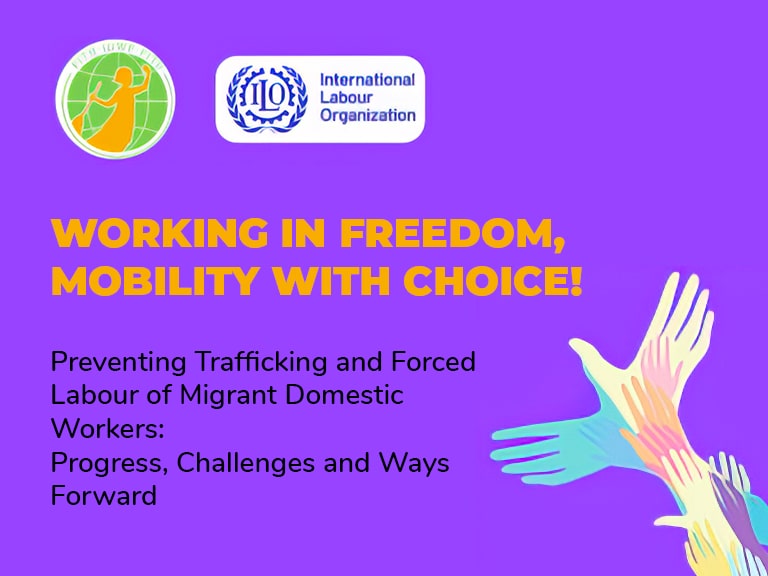- This event has passed.
Place migrants in the centre, not in the dark, Shiella Estrada spoke at the launch of GCM review
Shiella Estrada, migrant domestic worker leader, spoke at the launch of the first Asia-Pacific Regional Review of Implementation of the Global Compact for Safe, Orderly and Regular Migration (GCM) from 10th-12th March 2021. She calls for listening to migrants, the right to freedom of association and basic labour rights.
Details
By Shiella Estrada, Chairperson,
Progressive Labour Union of Domestic Workers of the Philippines, Hong Kong
Good morning ladies and gentlemen, distinguished delegates and guests of the GCM review,
My name is Shiella Estrada. Being a migrant domestic worker for 30 years and a worker leader, I handle cases, do advocacy and organise my fellow workers into trade unions. I experience what it means when migrant workers are organised and have a voice.
Distinguished delegates, the GCM should place migrants in the centre. Without being organised and a voice of migrants, you won’t know the real problems and truth. You all can shed lights on migration if you listen to us as migrants. Hard work and collaboration are needed to ensure policies and laws are in place to protect the rights of migrants and humanity. We bring developments to the countries and economic benefits but don’t place us in the dark.
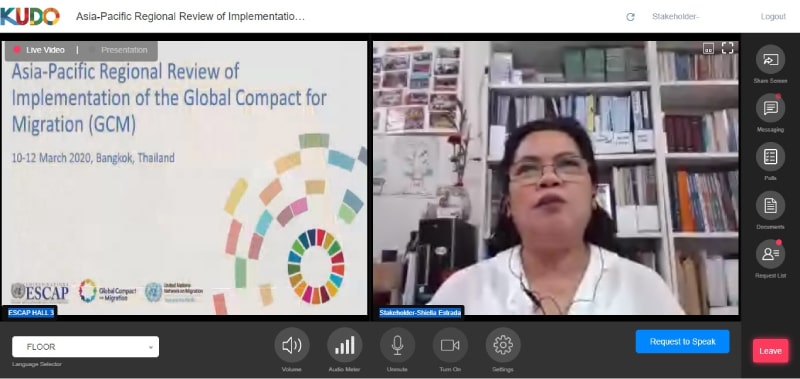
When we speak of migrants here, we speak of them regardless of their status. They should not be abused, and their rights should not be stripped off due to their visa or status. Their freedom should not be tied with their employers or visas. They should have the freedom to escape from the exploitative situation and change employers. Rights to family unity and residence status if we want.
When we speak of migrants in the Asia Pacific, we speak of women migrants, especially domestic workers. The Asia Pacific hosts almost a quarter of the world’s women migrant domestic workers. 24% of adults in forced labour are domestic workers. We have heard non-stop migrant domestic workers abused to death. There should be no more delays to revise your labour laws to recognise domestic workers, agricultural and all kinds of workers. Please stop all forms of discriminations and ensure migrants be free from gender-based violence.
The COVID pandemic has revealed the vulnerability of migrants. Due to government responses to the pandemic, such as border closures, lockdowns, curfews, migrants are faced with terminations. They are left with no jobs and food, no health and PPE protection, but lockdowns at employers’ home, their congested boarding house, or even abandoned on the streets. Raids against migrants further put them into the dark. Stigmatisation and racial discrimination are rampant, which risks migrants’ health and even lives.
We urge governments to integrate migrant health in their COVID-19 response. All migrants regardless of status must have access to quality public services and social protection.
The COVID-19 pandemic has exacerbated wage theft against migrant workers. Governments should exhaust all efforts to expedite justice for affected migrant workers and ensure payment of their claims.
Freedom of association, the right to collective bargaining are fundamental for workers and should be taken as a core in migration. Respect our rights to be organised. Allow us to have our own unions to negotiate.
Allow us to regularise our status. Migrants are human beings who should enjoy social, cultural and political rights like all of you and everyone else.
There should be channels and support for us in redressing complaints and accessing justice. The recruitment process should be regulated and monitored—Ban recruitment agency fee. Ensure no debt bondage suffered by migrants. The ILO’s “General Principles and Operational Guidelines on Fair Recruitment” must be embedded into the GCM governments’ national action plans on migration governance.
Ratify the relevant UN standards on migration and the ILO conventions – the C97 on Migration for Employment and Convention 143 on Migrant Workers, C189 on domestic workers, C190 on Violence and Harassment.
Majority of migrants in the Asia Pacific are forced to leave their home countries because of poverty and unemployment. States should prioritize creation of decent work so that we are not forced to migrate out of necessity.
Finally, I would like to highlight something very important and troubling. The large networks of trade unions and civil society organisations to which I belong have participated in the GCM process from its beginnings in the New York Declaration since 2015 right up to the adoption of the GCM in 2018 at the national, regional, and global level.
Yet at this review stage we have found ourselves marginalised. We found the process of organising this review to be non-inclusive and disrespectful, especially as we represent so many organisations and unions across the Asia-Pacific.
Thus, with deep apologies we regret to inform you that entire networks representing the voices of migrant workers who is at the heart of the topic on which we are speaking today, will be withdrawing from the rest of this first Asia-Pacific Regional Review on the Implementation of the GCM. [see note below]
UN ESCAP, ILO, and IOM have responded appreciating the decision, acknowledging and recognizing the reason for our pull out, expressing that in future we should not hesitate to raise our concerns, and ensuring that our premise for returning will be worked upon and that we will be informed of the same today. We must be attentive.
As stakeholders, however, we continue to remain fully committed to the implementation of the GCM in all its comprehensiveness and we call on all Member States and stakeholders to do the same.
We encourage that future review processes, including the IMRF, be deeply deliberated upon to ensure a process that is transparent, accountable, representative, and incorporates the views and participation of all stakeholders.
A longer statement is to follow. [see note below]
Thank you very much.
[note from the editor: the UN ESCAP and relevant UN agencies have received the statement signed by 43 trade union and civil society organizations from the Asia-Pacific region. They have reached out to us and recognize our concerns. With the positive responses from UN ESCAP, the ILO and IOM, we have agreed to return to the current sessions, and we will engage in a follow up process leading up to the International migration review forum. ]
